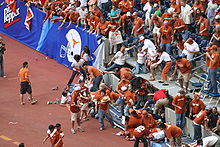Accident: Difference between revisions
mNo edit summary |
No edit summary |
||
| Line 1: | Line 1: | ||
{{for|other uses|Accident (disambiguation)}} |
{{for|other uses|Accident (disambiguation)}} |
||
[[Image:Partial stadium collapse at Big12 college football championship - 2005.JPG|right|thumb|A [[ |
[[Image:Partial stadium collapse at Big12 college football championship - 2005.JPG|right|thumb|A [[failing]] accidentally collapses at a [[college football]] game, spilling [[fan (aficionado)|fan]]s onto the sidelines]] |
||
An '''accident''' is a specific, identifiable, unexpected, unusual and unintended external action which occurs in a particular time and place, without apparent or deliberate cause but with marked effects. It implies a generally negative [[probabilism|probabilistic]] outcome which may have been avoided or prevented had [[Attendant circumstance|circumstances]] leading up to the accident been recognized, and acted upon, prior to its occurrence. |
An '''accident''' is a specific, identifiable, unexpected, unusual and unintended external action which occurs in a particular time and place, without apparent or deliberate cause but with marked effects. It implies a generally negative [[probabilism|probabilistic]] outcome which may have been avoided or prevented had [[Attendant circumstance|circumstances]] leading up to the accident been recognized, and acted upon, prior to its occurrence. |
||
Revision as of 20:23, 26 August 2009

An accident is a specific, identifiable, unexpected, unusual and unintended external action which occurs in a particular time and place, without apparent or deliberate cause but with marked effects. It implies a generally negative probabilistic outcome which may have been avoided or prevented had circumstances leading up to the accident been recognized, and acted upon, prior to its occurrence.
Experts in the field of injury prevention avoid use of the term 'accident' to describe events that cause injury in an attempt to highlight the predictable and preventable nature of most injuries. Such incidents are viewed from the perspective of epidemiology - predictable and preventable. Preferred words are more descriptive of the event itself, rather than of its unintended nature (e.g., collision, drowning, fall, etc.)
Accidents of particularly common types (auto, fire, etc.) are investigated to identify how to avoid them in the future. This is sometimes called root cause analysis, but does not generally apply to accidents that cannot be deterministically predicted. A root cause of an uncommon and purely random accident may never be identified, and thus future similar accidents remain "accidental."
Definition
Narrowly defined, the designation may refer only to the event, while not including the circumstances (facts surrounding) or results of the event; i.e., ‘accident’ is constrained to an immediate incident, the occurrence of which results in an unplanned outcome. In common use, however, ‘accident’ may include the entire interacting circumstantial framework (chance, pre-existing, or uncontrolled dynamically developing conditions; commonplace actions; random time and place; participants; etc.) leading up to, including, and resulting from, the accident's immediate occurrence.
Types
Physical and non-physical
Physical examples include, e.g., unintended collisions or falls, being injured by touching something sharp, hot, or electrical, or ingesting poison. Non-physical examples are, e.g., unintentionally revealing a secret or otherwise saying something incorrectly, forgetting an appointment, etc.
By activity
- Accidents during the execution of work or arising out of it are called work accidents.
- In contrast, leisure-related accidents are mainly sports injuries.
By vehicle
Most common causes

For physical traumas or injuries leading to hospital discharge, most common causes are traffic accidents and falls
See also
- Injury
- Accident proneness
- Air safety
- Aisles: Safety and regulatory considerations
- Bike
- Car
- Explosives safety
- List of rail accidents:
- List of nuclear accidents
- Risk management
- Sailing ship
- Safety
- Safety engineering
- Swiss Cheese model
- Tram accident
- Workplace safety
- Accident Analysis
External links
- Community database on Accidents on the Roads in Europe (CARE)
- GotSafety (Safety Tips and Information)
- Car-Accidents.com (Thousands of Photos, and Info on Types of Accidents.)
This article's tone or style may not reflect the encyclopedic tone used on Wikipedia. (December 2007) |
